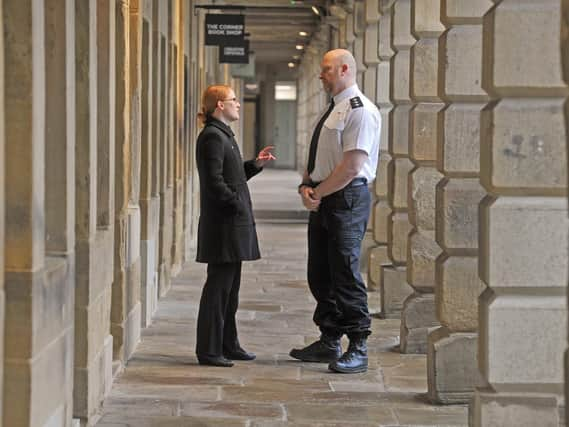MP took action after seeing life on the front line for the emergency services


During that night, the solitary officer she was with stopped a car for a routine enquiry, and ended up surrounded by an angry mob. Ms Lynch was forced to call 999 from the back of the police car for back up.
It was witnessing the harsh realities that police in Yorkshire face day in, day out, that led to her Protect the Protectors campaign to introduce harsher sentences on those who attack emergency service workers.The original bill fell victim to the House of Commons strict timings, but a second, in partnership with Rhondda Labour MP Chris Bryant - who topped a Private Member’s Bill ballot in June 2017 that would place him at the best chance of seeing his bill make it into law - will have its Third Reading on April 27, the last Commons stage it will face on its way to Royal Assent and becoming law.
Advertisement
Hide AdAdvertisement
Hide Ad“It has come such a long way since that night in 2016,” Ms Lynch told the Yorkshire Post. “Chris has been an absolute warrior getting this Bill through.
“It’s very unusual for a very new MP like myself to have an incident, and idea, and for it to become law - but I think the reason it’s been so successful so far is the incredible public support behind it.”
The Assaults on Emergency Workers Bill creates a new offence of assaulting an emergency worker. It will supersede the current assaulting a police officer charge, which carries a six month sentence. The new charge has a 12-month sentencing guideline and also enables bodily samples to be taken from those suspected of spitting or biting an emergency worker.
Ms Lynch said: “At the moment it is an offence to spit at someone but the police can only ask them if they have any communicable diseases or to voluntarily provide a sample. People who have been spat at face a six-month wait for tests to see if they have caught anything and months of potentially avoidable antiviral treatment.”
Advertisement
Hide AdAdvertisement
Hide AdFollowing her night in Halifax, Ms Lynch said police officers from across the country contacted her with “harrowing” stories which made her “determined to do something about it”.
As well as public backing, the bill has also received the support of the Government.
“I think the Government understands that they need to find ways to give our public workers a pat on the back,” Ms Lynch said. “We’ve had the recent terror attacks, and Grenfall, and there’s been a lot of platitudes for public workers but there’s been no pay increase.
“Because of the huge public support, I think it would be very difficult for them to reject this bill. That’s not to say we haven't had any argy bargy. It’s not gone as far as we hoped it would - we were hoping to push custodial sentences to 24 months rather than the 12 months in the bill.”
Advertisement
Hide AdAdvertisement
Hide AdWhile she remains “optimistic” the bill will make a difference, Ms Lynch says she is “not naive” in thinking “that will be it”. She is working with services to ensure staff are supported in reporting offences, and is continuing to campaign against cuts to services and to ensure police officers in particular are given the correct protective equipment.
She added: “To make a real comprehensive difference, there needs to be a package of measures, Protect the Protectors is just the start. “
Who does it cover?
The Bill covers all 999 responders - police, paramedics and fire service, plus search and rescue workers, coastguard, prison officers and NHS staff.
Ms Lynch said: “There will always be other public sector workers who will face risk as part of their job but as part of this bill we had to draw the line somewhere. While there is much more to do, and no one ever wants to see any public service worker attacked at work, we had to narrow it down to those involved in emergency service work.”